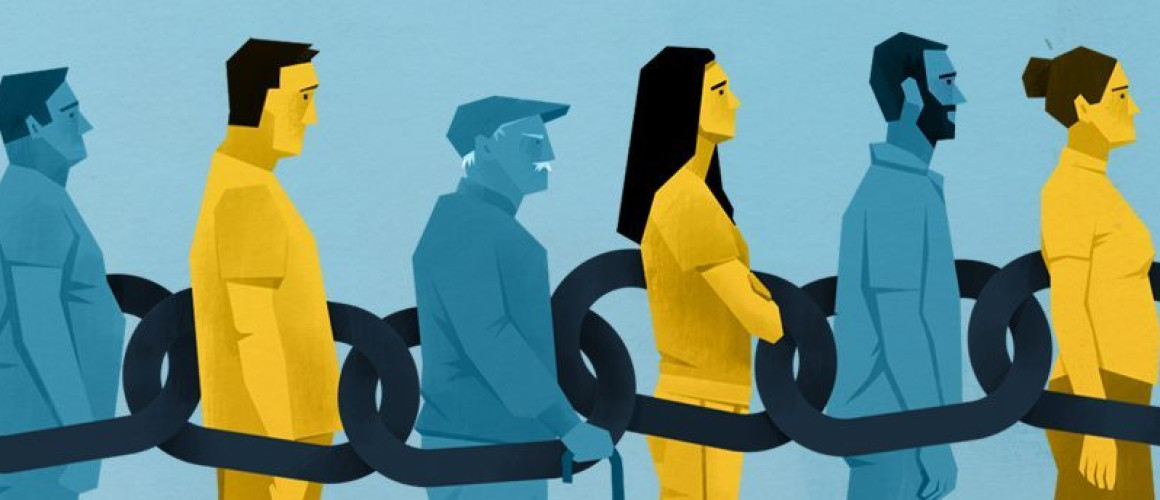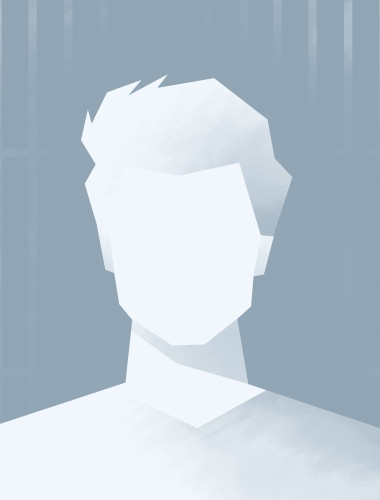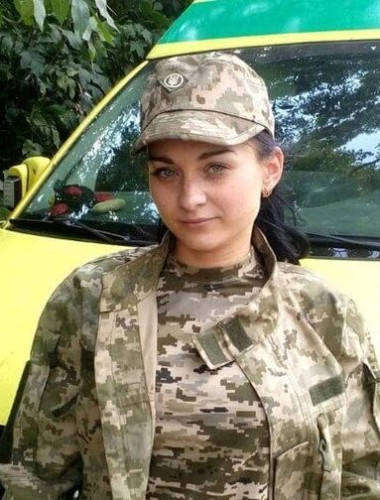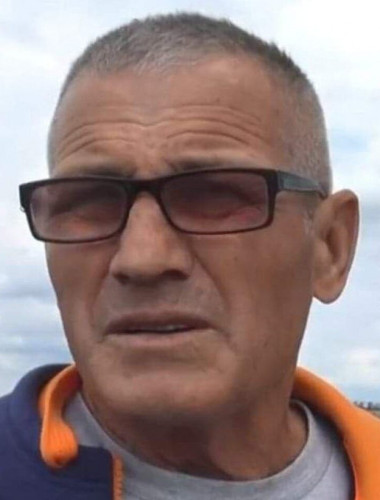Mykola Martyniuk, Kateryna Kuzmenko, Petro Tsarevskiy and Volodymyr Korsunov are political prisoners
Four Ukrainians from Luhansk Oblast, three of whom have disabilities, have been sentenced to terms of imprisonment for having served in the Aidar Battalion in 2014-2017
The ‘Political Prisoners. Memorial’ human rights project, in accordance with international standards, considers Ukrainians Mykola Martyniuk, Kateryna Kuzmenko (Korshyk), Petro Tsarevskiy and Volodymyr Korsunov as political prisoners. The four have been convicted on a charge of participation in a terrorist group for their service in the Aidar Battalion of the Ukrainian armed forces. The prosecution and conviction of the former military service personnel violate their right to fair trial, as well as the Geneva Conventions on the treatment of prisoners of war and civilians during war. We demand the immediate release of Mykola Martyniuk, Kateryna Kuzmenko, Petro Tsarevsky and Volodymyr Korsunov and an end to their criminal prosecution.
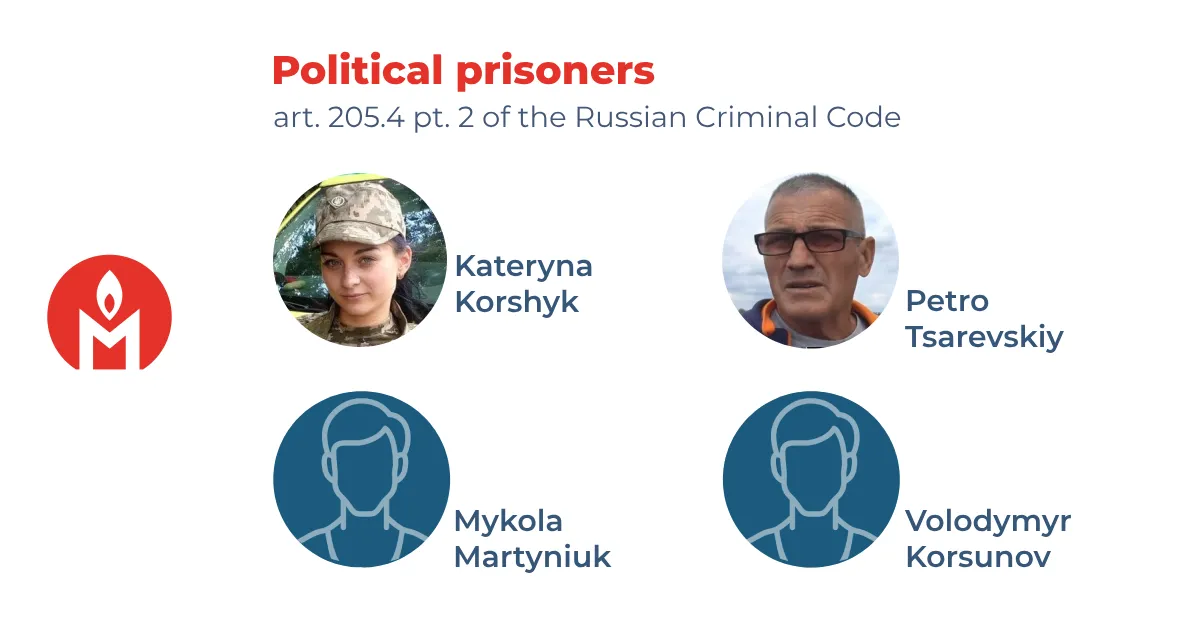
What were the charges against the former members of the Aidar Battalion?
Ukrainians Mykola Martyniuk, Kateryna Kuzmenko, Petro Tsarevskiy and Volodymyr Korsunov served for various years in the 24th Separate Assault Battalion of the Ukrainian Armed Forces, created in 2015 on the basis of the Aidar Battalion.
Private Martyniuk did his military service there during his mobilization in 2014-2015; Kuzmenko served there as a medical orderly in 2015-2017; from April to December 2014 Tsarevskiy was a member of the Starobilsk Self-Defence Unit, which subsequently became part of the Aidar Battalion; Korsunov served as head of the Guard Unit from November 2014 to February 2015.
At the time of Russia’s full-scale invasion of Ukraine, none of the four were affiliated with the armed forces but all of them were detained at different times in the occupied territories by Russian security forces. Three of the four have disabilities. Kateryna Kuzmenko suffers from an incurable autoimmune disease; 70-year-old Petro Tsarevskiy has diabetes; and 76-year-old Volodymyr Korsunov has been diagnosed with intestinal cancer.
According to the prosecution, the Ukrainians were involved in the Aidar Battalion and therefore participated in a terrorist group (Article 205.4, Part 2, of the Russian Criminal Code).
On 6 October 2023, a military court in Rostov-on-Don ordered that Kateryna Kuzmenko serve her sentence in a low-security penal colony, the exact term is unknown. On 5 December 2023, Mykola Martyniuk was sentenced to five and a half years in a general-regime penal colony. On 17 April 2024, Volodymyr Korsunov was sentenced to five years in a low-security penal colony. On 18 June 2024, Petro Tsarevskiy was convicted as charged, however, the sentence handed down is not known.
Why do we consider Mykola Martyniuk, Kateryna Kuzmenko, Petro Tsarevskiy and Volodymyr Korsunov political prisoners?
Ukrainians Mykola Martyniuk, Kateryna Kuzmenko, Petro Tsarevskiy and Volodymyr Korsunov were not tried for specific crimes of violence, but for involvement in the Aidar Battalion of the Ukrainian armed forces.
This grossly violates the provisions of the Geneva Conventions, which prohibit the prosecution of combatants for participation in an armed conflict and the use of collective punishment. The designation of individual units of the Ukrainian armed forces as terrorist groups has been intended to provide grounds for such collective punishments.
We note that decisions to designate the Aidar Battalion as a terrorist organization, adopted in the self-proclaimed DNR and LNR in 2016, are legally null and void on the grounds that the DNR and LNR are themselves unlawful entities. In the Russian Federation, the Aidar Battalion was designated a terrorist group in September 2023. However, all these decisions concern the Aidar Battalion, not the 24th Separate Assault Battalion of the Ukrainian armed forces.
At the same time, all of those convicted had left the Ukrainian armed forces long before the start of Russia’s invasion of Ukraine and the time of their detention.
For Tsarevskiy, Kuzmenko and Korsunov, who have disabilities, imprisonment may prove a death sentence. The state of their health requires immediate medical intervention.
A detailed description of the cases of Mykola Martyniuk, Kateryna Kuzmenko, Petro Tsarevskiy and Volodymyr Korsunov and of our position is available on our website.
Recognition of an individual as a political prisoner does not imply the ‘Political Prisoners. Memorial’ human rights project agrees with, or approves, their views, statements, or actions.
How can you help?
You can write letters to Petro Tsarevskiy at the following addresses:
In Russian: 344022, г. Ростов-на-Дону, ул. М. Горького 219, ФКУ СИЗО-1 ГУФСИН России по Ростовской области, Царевскому Петру Фёдоровичу 1954 г. р.
In English: Petro Fedorovych Tsarevskiy (born 1954), Remand Prison No. 1, Federal Penitentiary Service of Russia for Rostov Oblast, 219 Maksima Gorkogo Street, Rostov-on-Don, 344022, Russia
You can also send an email via F-Pismo and ZT services (for payment with Russian bank cards), PrisonMail (for payment with foreign bank cards) and Memorial-France (free of charge).
Please note that letters in languages other than Russian are highly unlikely to reach the recipient.
Please get in touch if you have information concerning the whereabouts of Kateryna Kuzmenko, Volodymyr Korsunov and Mykola Martyniuk.
You can donate to help all political prisoners in Russia.
